Three movie posts in a row? What the hell is this?
Assault on Precinct 13
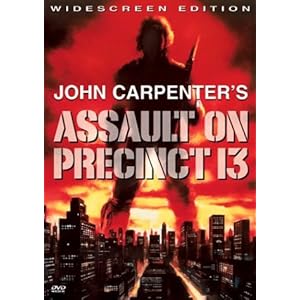
A pretty early John Carpenter film, which can be seen as a super violent action movie before super violent action movies were really a thing. It has elements of westerns and zombie movies, and tells the story of a few police officers and criminals defending a closed-down police station from a fraternity of gangs on the warpath. There are definitely bits of the movie I liked a lot, as it manages to build suspense and have some solidly exciting scenes despite a low budget. There are definite issues with the script though, which is a bit lean in some places and is filled with tough action dialogue that I could barely tolerate, especially for the lead good guy criminal. Stop being cute and act like a human being for five minutes, man.
Going My Way

A Best Picture winner starring Bing Crosby as a priest who comes to a new church and helps make it a nicer place, mostly by using his musical talent to keep it going and form a choir with its population of young boys. There's not really a lot of depth to the movie, but I found it mostly enjoyable. On occasion the musical numbers (it's not really a musical, but does have a lot of singing) seemed to go on a bit long, but in the end it's a nice tale of spirituality and kindness and whatever. I like Bing. Bing's a pretty cool dude.
Last Year at Marienbad
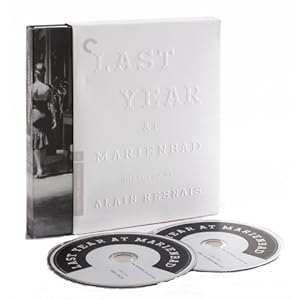
When people talk about incomprehensible foreign art films, this is basically exactly what they're talking about. Marienbad is a French movie about a man who tries to convince a woman that they had met and had an affair a year earlier at another place, and either he's making it all up or she just forgot somehow or she's deliberately pretending she doesn't know what he's talking about. The movie never really explains itself, and I don't think there really is a straight answer anywhere. It's not that the scenes don't follow or are made up of gibberish, it's just that it's really difficult to tell when things are taking place or where or what's real or if any of it is. I appreciated the great artistry that went into filming it, but I also can't say I really liked it. There's just no way to make heads or tails of it.
The Long Goodbye
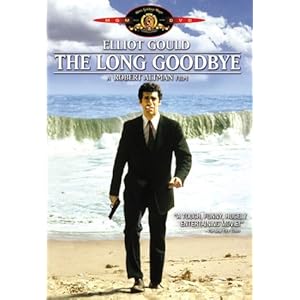
My favorite classic film noir might be The Big Sleep, starring Humphrey Bogart as Philip Marlowe. Robert Altman and Elliot Gould revived the character in the 70s with The Long Goodbye, moving him into that decade and highlighting the anachronism of a 40s hardboiled detective living in a then-modern LA. Some people don't like the way the movie plays with the genre or the deviations from the original novel, but I thought it was a mostly entertaining movie. It's also funny to see a very early appearance by Arnold Schwarzenegger as a thug who doesn't have any lines. Not a traditional detective story, but I think it's an interesting one.
The Phantom of the Opera
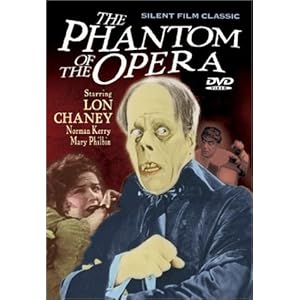
You know, I always got the impression that the Phantom was supposed to be a sympathetic figure, like his horrible visage masked a kindness and he was only secretive because of a life of torment, or something like that. But he really isn't. He kidnaps a woman and basically tells her he'll kill everyone if she goes back to her boyfriend instead of staying with him. Not cool, dude. This version of the story from the 20s is probably the best known film version, and it's pretty watchable, though not terribly exciting now. Lon Chaney's makeup is pretty good, but there's not much about the movie that's really scary. Not much of the good imagery from other silent horror classics. Still, probably worth checking out.
The Private Life of Sherlock Holmes

I guess there's some disappointment that when Billy Wilder makes a Sherlock Holmes movie that begins by teasing that its story will be surprising and possibly controversial, and the ends up just being a pretty normal Sherlock Holmes movie. In fact, the entire opening sequence where he lies about his sexuality to get out of a jam and which is the only thing that's truly original about the story, ends up being kind of a waste of time as it only barely plays into the rest of the film. It's not a big deal though, because it's a well paced, interesting mystery for Holmes and Watson to solve, with plenty of clues that seem odd at first but end up coming together to make a strange sort of sense. No Moriarty here, but we do have Christopher Lee as Mycroft, which is pretty delightful. Not an outstanding movie but a fun one. Not sure about the new Guy Ritchie sequel, though. Is it just me, or are none of the jokes in the previews actually funny?
Rome, Open City
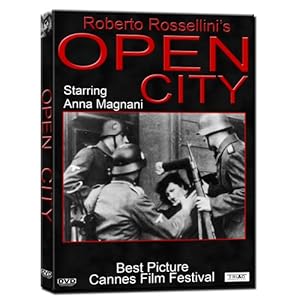
Italian neorealism! Catch the fever! Open City is remarkable for its depiction of the late Nazi occupation in Italy only months after the war actually ended, and for how unflinching it is in depicting the period. They didn't experience some of the worst horrors of the war, but it sure wasn't fun to resist the Third Reich at any point during their reign. The film suffers a bit from Italians Yelling a Lot Syndrome, but it's a well crafted piece of historical fiction, and I'm still impressed by it following so soon after the actual events it tries to reflect. A solid way to help kick off an important film movement.
Sunday, October 30, 2011
Movie Update 27
Friday, June 3, 2011
Movie Update 7
Do I really have nothing significant to get off my chest about any of these movies, or am I just getting lazy? You decide.
À Nos Amours

Amours is another film in the Incredibly Painful to Watch Family Drama style, this time coming from France. It's about a girl who doesn't know what she wants out of life, and has a difficult relationship with her parents and brother, and the only way she knows how to cope with both is to spend time with a variety of men. She's not sure she's capable of loving anyone, while at the same time she gets guys to fall for her. It's not very pleasant to watch, but that's why it's a success. It's a very real seeming movie, and the reality it presents isn't pretty. The dad is the most interesting character, I wish he had more scenes.
The Cotton Club

The Cotton Club is sort of like a Boardwalk Empire movie with a lot of singing and dancing and not much else. Richard Gere stars as a New York musician who gets involved with gangsters, falls in love with one of their girlfriends, and then uh... the plot kind of trails off. There's also a plot about a pair of tap dancing brothers. The movie is more about the famous club itself than a real story, and I felt this hurt it quite a bit. It's not bad, there's just not much of an arc there. Things happen for a while and then they stop. A very young Diane Lane looks nice, Nick Cage gives a wacky early performance, and James Remar is pretty awful as the big bad gangster. Bob Hoskins is better as one of his business partners. Apparently Gere played his own trumpet for this movie, which is kinda cool. Bottom line, when your director made The Godfather, you kind of expect more from the other organized crime movies he makes than this.
Duck Soup

I've seen bits of Marx Brothers movies before, but this is the first time I watched one all the way through. It's pretty short, and packed to the brim with hysterical scenes. It's sort of the perfect blend of silent movie slapstick with modern witty dialogue. Groucho is appointed the leader of a country called Freedonia, and spends more time coming on to women and screwing around than directing policy. Chico and Harpo are spies for a conniving foreign ambassador, and also screw around a lot more than they do their jobs. Zeppo is the one who never developed a funny personality of his own, and he's basically just there, in his last film with his brothers. There's a lot of great lines and funny set-ups, though to be honest the hardest I laughed the whole time was at a couple scenes where Harpo was just being a douchebag to a street vendor. The fact that he never really got his comeuppance somehow makes the whole thing better. The mirror scene is a classic, too. I definitely want to see more of their movies together.
The Graduate
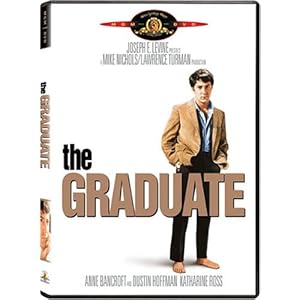
The first two films Mike Nichols ever directed were Who's Afraid of Virginia Woolf? and this, which is pretty damn impressive. It features the great Dustin Hoffman's first big role as a college graduate who doesn't know what he want out of his life when he is seduced by the wife of his dad's business partner. From there, things get more complicated. The style of the film is really great, with every shot seeming to be carefully chosen, and I liked the unusual nature of the main performances. The integration of Simon and Garfunkel tunes into the film works well, too. It's too funny to be a drama and not really that terribly funny for a comedy, but it straddles the line well, and it's just a unique, memorably movie. Not much about it I didn't like.
Gran Torino

I think this is a movie that would have benefited if Clint Eastwood wasn't the only person from it you've heard of. Not that a movie needs stars to be good, or that there isn't a reason he went with an unknown cast. It's just the acting in general is pretty bad besides Eastwood itself, and when you're dealing with the delicate race issues the story addresses, bad actors sort of exacerbates the issue. Some scenes become downright laughable when they should be dramatic and tense. Eastwood's direction is good enough, and the story interesting enough, that the film is mostly able to overcome a lot of these flaws, I still found it to be more of a pretty interesting experiment than a truly good movie, though. I kind of liked that his character really is just a total racist who ends up mixed up in something where he can do some good, rather than it being something hokey like a misguided old man who eventually sees the error of his ways. A very simple movie that I think could have been better.
La Jetée

This is a short film composed entirely of still images. It was an inspiration for the film 12 Monkeys. If you know about 12 Monkeys, you can guess that this short film is about time travel, and you'd be right. The story is pretty intriguing if light on actual detail, and has a pretty haunting ending. Very cool experiment more than a real movie.
The Spirit of the Beehive

A Spanish film that is probably some sort of metaphor or allegory based on how it went. Shortly after their civil war, a child watches Frankenstein and becomes enchanted with the idea of spirits. It's a slow paced movie without a ton of dialogue or plot, but it does some interesting things with the classic tale and has a mood that enhances it greatly beyond the simple workings of the story. The direction, lighting, editing, and performances all combine to create a very chilling, dreamy atmosphere. It's the kind of movie that I recognize as good, but make me glad I decided to stop writing a full review for everything I see. I just don't have many words for it.
This Is Spinal Tap
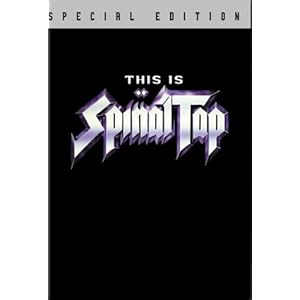
The quintessential mockumentary. I was a bit surprised by the general flow of the movie, which didn't have as many wacky laugh-out-loud moments as I expected, and actually made sure to tell a real story about friendship and growing old with its silly fake hair metal band. The film follows around Spinal Tap when their star has faded, and they find themselves playing smaller venues than they're used to and struggling to put out a new album with their artistic vision intact. It's a funny movie, but it's also a very poignant one. And while the jokes aren't constant, they're still generally really good ones, especially whenever Christopher Guest is on the screen. Obviously "but this goes to 11" is the classic, but I also really loved him showing Rob Reiner the piano piece he'd been working on and especially his reaction to the album cover that was chosen for them. I should get around to checking out some of the movies he directed himself.
Werckmeister Harmonies
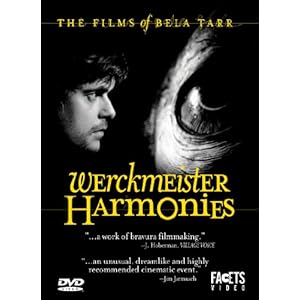
A film by Béla Tarr, the master of the long take. Harmonies is probably most famous for lasting over two hours yet being composed of only 39 individual shots, though the camera moves so much within a scene that if you saw several still images from one take you'd assume they were all different shots. Not that you don't feel the effect of the unique filming style, lots of time is spent showing characters perform mundane tasks for minutes on end, which helps create a mood that is unique to his work. The movie works because it has a haunting story and features a number of extremely striking images throughout, images which have their power enhanced by the way they're lingered on. Besides the style though, the rest of the movie didn't grab me that much. I just can't get interested in the stories themselves, despite the way Tarr presents them. I'd recommend it to someone before Satantango if they were interested in checking out his work, if only because it isn't seven hours long.

































